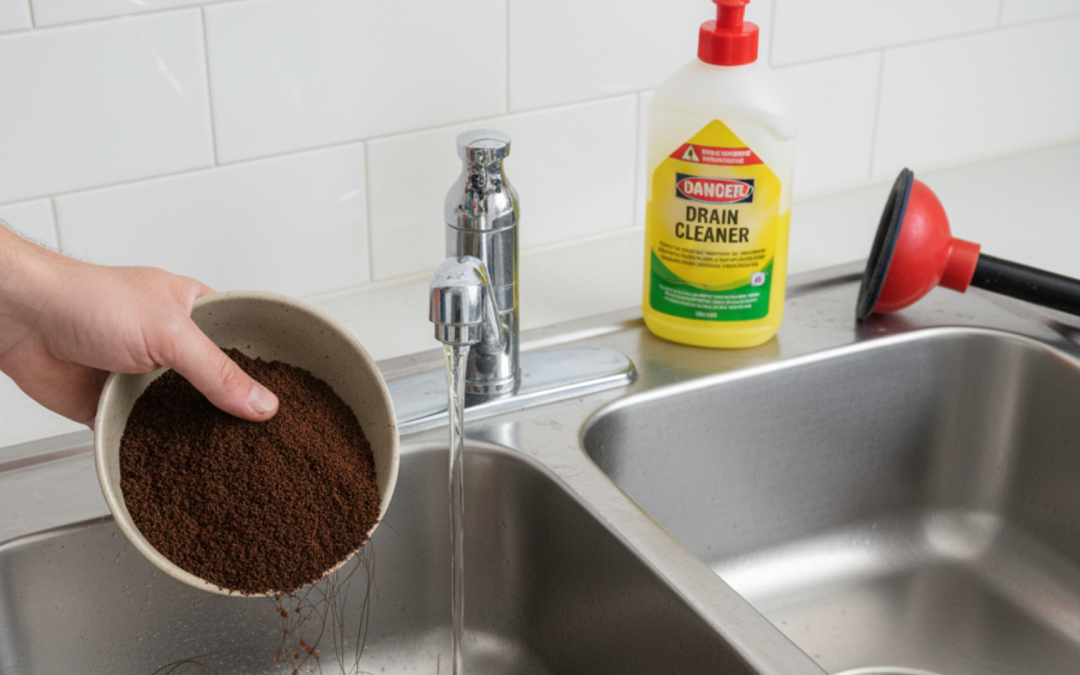Maintaining a healthy drainage system is essential for keeping your home clean, safe, and free from unpleasant odors. However, many homeowners make simple but damaging mistakes that can lead to clogged drains, leaks, and costly repairs. Drain problems often develop slowly, which means bad habits can go unnoticed until they cause serious plumbing issues. Understanding what to avoid is just as important as knowing how to care for your drains properly. Below are the most common drain care mistakes and how to prevent them for a long-lasting, efficient drainage system.
1. Pouring Grease and Oil Down the Drain
One of the biggest mistakes people make is pouring cooking oil, grease, or fat down the sink. When hot, these substances may seem harmless and easy to wash away, but they solidify as they cool inside your pipes. Over time, the buildup creates sticky layers that trap food particles and debris, leading to serious blockages. The result is a slow or completely clogged drain that requires professional cleaning to fix. Even small amounts of grease can accumulate quickly, causing long-term damage if not addressed early.
Instead of disposing of grease through your sink, let it cool and pour it into a disposable container or jar before throwing it in the trash. You can also wipe greasy pans and dishes with paper towels before washing them. This simple change in routine can prevent many drainage problems and reduce the frequency of blockages. Proper grease disposal is one of the most effective ways to protect your drains and keep your plumbing system running smoothly for years.
2. Overusing Chemical Drain Cleaners
While chemical drain cleaners may seem like a quick fix, they are often harmful to your plumbing system. These cleaners contain harsh ingredients such as sodium hydroxide and sulfuric acid, which can corrode metal pipes and weaken PVC joints. Frequent use can cause your pipes to deteriorate from the inside, leading to leaks or cracks that are expensive to repair. In addition, chemical cleaners can produce toxic fumes that are harmful to both your health and the environment.
A safer and more effective alternative is to use natural cleaning solutions such as baking soda and vinegar or professional drain cleaning services. Natural methods break down residue without harming your pipes, making them suitable for regular maintenance. If your drains are severely blocked, it’s always best to call a professional plumber who can clear the issue safely using specialized tools. Avoiding chemical cleaners not only protects your pipes but also helps maintain a cleaner, greener home environment.
3. Ignoring Early Warning Signs
Another common mistake is ignoring the early warning signs of drainage problems. Many people overlook slow-draining sinks, gurgling noises, or foul odors, assuming they will go away on their own. In reality, these are the first signs of a developing clog or blockage that needs attention. Waiting too long to act can cause the issue to worsen, leading to complete drain failure or even sewer backups. Early intervention can save you time, money, and frustration in the long run.
To avoid this mistake, make it a habit to monitor your drains regularly. If you notice any unusual behavior—such as water draining slower than usual or bad smells coming from the pipes—take immediate action. Simple measures like flushing with hot water or using a plunger can prevent the problem from escalating. When in doubt, contact a professional for an inspection. Addressing minor issues promptly ensures your drainage system stays healthy and efficient.
4. Using Drains as Trash Bins
Many homeowners treat their drains as if they can handle anything, but this is a major mistake. Flushing items like paper towels, sanitary products, wipes, and even food scraps can lead to severe blockages. Unlike toilet paper, these materials don’t break down easily and often get stuck in bends or joints within the pipes. Over time, this buildup restricts water flow and can even cause damage to your plumbing system. In worst cases, it can lead to costly pipe replacements.
To maintain smooth water flow, always use trash bins for solid waste. In the kitchen, dispose of food leftovers properly instead of washing them down the sink. In bathrooms, avoid flushing anything other than toilet paper. Small changes in daily habits can make a big difference in preventing drainage issues. Remember, your drain is designed for water and liquid waste only. Treating it properly ensures long-term reliability and minimizes the risk of clogs or overflows.
5. Skipping Regular Drain Maintenance
The last and most overlooked mistake is failing to schedule regular drain maintenance. Many homeowners wait until a major blockage occurs before calling a plumber, but by then, the damage may already be done. Routine maintenance is essential to keep your drains clean, detect early signs of wear, and prevent costly repairs. Neglecting maintenance not only shortens the lifespan of your plumbing system but can also lead to hidden leaks and unpleasant smells.
You can easily prevent these issues by cleaning your drains at least once a month using hot water or natural cleaning agents. For deeper cleaning, consider hiring a professional drain service once or twice a year. They use advanced tools such as hydro-jetting to remove stubborn buildup safely. A little effort in preventive care goes a long way in maintaining smooth water flow and keeping your drainage system in top condition.
Conclusion

